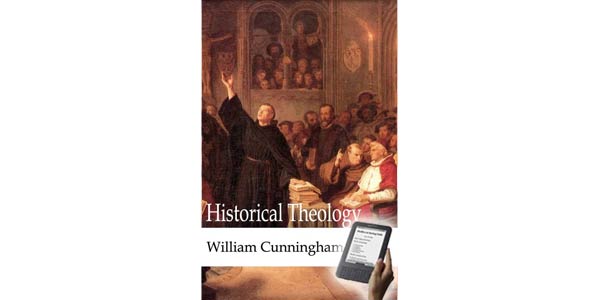 by William Cunningham
by William Cunningham
in ePub, .mobi & .pdf formats
The study of the history of theology throws light on both truth and error. It helps us to recognise old heresies when we meet them in modern dress, and introduces us to the classical elucidations of truth which overthrow them for all time. William Cunningham’s 2-volume Historical Theology, derived from his lectures given at New College in Edinburgh from 1847–1861, tells the story of the church through the history of its theology. From a decidedly biblical/Reformed perspective he chronicles the theological tension between law and grace, between sin and forgiveness, and between Christ’s first coming and his second. Volume one covers the biblical view of the church, the church councils and the apostolic fathers, the development of the church’s central doctrines—such as the incarnation and the Trinity—as well as the rise of scholasticism, the Reformation, and the Council of Trent. In volume two, Cunningham documents the development of the doctrine of justification, the doctrine of the atonement, the Arminian controversy, and the Socinian controversy. He also devotes lengthy discussions to Presbyterianism, Congregationalism, and the Free Church of Scotland.
-----
Table of Contents
CHAPTER I. —THE CHURCH
1. Nature of the Church.
2. Notes of the Church.
3. Promises to the Church.
4. Different Theories of the History of the Church .
CHAPTER II. —THE COUNCIL OF JERUSALEM
1. Scripture Narrative.
2. The Rule of Church Power.
3. Authority of Church Officers.
4. The Place of Church Members.
5. Subordination of Church Courts.
6. Obligation of Apostolic Practice.
7. Divine Right of a Form of Church Government.
CHAPTER III. —THE APOSTLES' CREED
CHAPTER IV. —THE APOSTOLICAL FATHERS
Introduction.
1. Barnabas.
2. Hermas.
3. Clemens Romanus.
4. Polycarp.
5. Epistle to Diognetus.
6. Ignatius.
CHAPTER V. —THE HERESIES OF THE APOSTOLIC AGE
CHAPTER VI. —THE FATHERS OF THE SECOND AND THIRD CENTURIES
Introduction.
1. Justin Martyr.
2. Irenaeus.
3. Clemens Alexandrinus.
4. Origen.
5. Tertullian.
6. Cyprian.
CHAPTER VII. —THE CHURCH OF THE FIRST TWO CENTURIES
Introduction.
1. The Doctrines of Grace.
2. The Sufficiency of Scripture.
3. Rights of the Christian People.
4. Idolatry.
5. The Sacraments.
6. The Papal Supremacy.
CHAPTER VIII. —THE CONSTITUTION OF THE CHURCH
1. Prelacy:—State of the Question.
2. Prelacy:—Argument from Antiquity.
CHAPTER IX. —THE DOCTRINE OF THE TRINITY
1. Testimony of the Early Church on the Trinity.
2. Nicene Creed—Consubstantiality.
3. Nicene Creed—The Eternal Sonship.
4. Nicene Creed—Procession of the Spirit.
CHAPTER X. —THE PERSON OF CHRIST
1. The Eutychian Controversy,
2. The Nestorian Controversy.
CHAPTER XI. —THE PELAGIAN CONTROVERSY
1. Historical Statement.
2. Depravity—Original Sin.
3. Conversion—Sovereign and Efficacious Grace.
4. Perseverance of the Saints.
CHAPTER XII. —THE WORSHIP OF SAINTS AND IMAGES
1. Historical Statement.
2. Doctrinal Exposition.
CHAPTER XIII. —THE CIVIL AND ECCLESIASTICAL AUTHORITIES
1. Voluntaryism.
2. Coordinate Authorities.
3. Erastianism.
4. Popish Theory.
CHAPTER XIV. —SCHOLASTIC THEOLOGY
CHAPTER XV. —THE CANON LAW
CHAPTER XVI. —WITNESSES FOR THE TRUTH DURING THE MIDDLE AGES
1. Perpetuity and Visibility of the Church.
2. Waldenses and Albigenses.
CHAPTER XVII. —THE CHURCH AT THE ERA OF THE REFORMATION
CHAPTER XVIII. —THE COUNCIL OF TRENT
CHAPTER XIX.. —THE DOCTRINE OF THE FALL
1. Popish and Protestant Views.
2. Guilt of Adam's First Sin.
3. The Want of Original Righteousness.
4. Corruption of Nature.
5. Concupiscence.
6. Sinfulness of Works before Regeneration.
7. Sinfulness of Works after Regeneration.
CHAPTER XX.. —THE DOCTRINE OF THE WILL.
1. The Will before and after the Fall.
2. The Bondage of the Will.
3. Bondage of the Will—Objections.
4. The Will in Regeneration.
5. God's Providence, and Man's Sin.
CHAPTER XXI. —JUSTIFICATION.
1. Popish and Protestant Views.
2. Nature of Justification.
3. Imputation of Christ's Righteousness.
4. Justification by Faith alone.
5. Office of Faith in Justifying.
6. Objections to the Scriptural Doctrine.
7. The Forgiveness of Post-baptismal Sins.
8. The Merit of Good Works.
9. Practical Tendency of the Popish Doctrine of Justification.
CHAPTER XXII. —THE SACRAMENTAL PRINCIPLE.
1. Sacramental Grace.
2. Baptismal Regeneration.
3. Popish View of the Lord's Supper.
4. Infant Baptism.
CHAPTER XXIII. —THE SOCINIAN CONTROVERSY.
1. Origin of Socinianism.
2. Socinian Views as to Scripture.
3. Socinian System of Theology.
4. Original and Recent Socinianism.
5. Distinction of Persons in the Godhead.
6. Trinity and Unity.
7. Evidence for the Divinity of Christ.
CHAPTER XXIV. —DOCTRINE OP THE ATONEMENT.
1. Connection between the Person and Work of Christ.
2. Necessity of the Atonement.
3. The Necessity and Nature of the Atonement.
4. Objections to the Doctrine of Atonement.
5. Scriptural Evidence for the Atonement.
6. Socinian View of the Atonement.
7. Arminian View of the Atonement.
8. Extent of the Atonement.
9. Evidence as to the Extent of the Atonement.
10. Extent of Atonement and Gospel Offer.
11. Extent of Atonement, and its Object.
12. Extent of the Atonement, and Calvinistic Principles.
CHAPTER XXV. —THE ARMINIAN CONTROVERSY.
1. Arminius and the Armenians.
2. Synod of Dort.
3. The Five Points.
4. Original. Sin.
5. Universal and Effectual Calling.
6. Efficacious and Irresistible Grace.
7. The Decrees of God.
8. Predestination-State of the Question.
9. Predestination, and the Doctrine of the Fall.
10. Predestination, and the Omniscience of God.
11. Predestination, and the Sovereignty of God.
12. Scripture Evidence for Predestination.
13. Objections against Predestination.
14. Perseverance of Saints.
15. Socinianism-Arminianism—Calvinism.
CHAPTER XXVI. —CHURCH GOVERNMENT.
1. Presbyterianism.
2. Testimony of the Reformers as to Presbyterianism.
3. Popular Election of Office-bearers.
4. Congregationalism, or Independency.
CHAPTER XXVII. —THE ERASTIAN CONTROVERSY.
1. The Civil Magistrate and Religion.
2. Erastus and the Erastiana.
3. Erastianiam during the Seventeenth Century.
4. The Free Church of Scotland.
